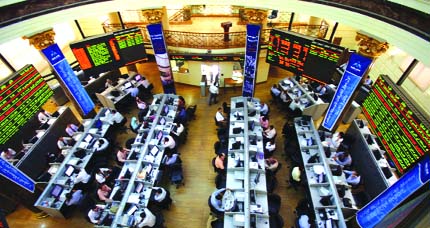
Xinhua, Cairo :
The Egyptian stock exchange (EGX) lost over the past three trading sessions what it gained over a whole year, with financial experts attributing the sharp decline to the recent warnings of the International Monetary Fund (IMF) over excessive risk taking in “frothy” stock markets.
In one week, the EGX capital market lost more than 5.3 billion U.S. dollars, 1.7 of which was lost upon closure of Thursday’s trading session that included a frenzy of sales on the part of individual shareholders.
EGX of course is not necessarily among the markets meant by the IMF, which refrained from naming any, but the Egyptian financial market has been greatly affected in response to the sharp decline of world markets, particularly those of the United States and Europe.
“The stock market fall in the United States and other world markets is among the reasons for the EGX sharp decline,” said financial expert Ahmed Etaisi, noting a plunge for profit- collection in the EGX has been expected but the decline in world markets made it worse.
Etaisi, head of investment and finance sector at a trading company, argued that the declining world stock markets is likely to affect worldwide economic growth rates that will in turn affect those of Arab oil-rich states like Saudi Arabia and the United Arab Emirates (UAE).
“Egypt is leaning on Saudi Arabia and the UAE while attempting to recover ailing economy,” he said. “So, when their growth rates decline, their aids to Egypt, their trade rates and the remittances of Egyptian expatriates will all decline in turn. They are all interrelated cycles.”
“The IMF warning report undoubtedly had a global effect and hence it affected the EGX, which is not isolated from the world market,” Etaisi continued.
The EGX responded to the major events in the country over the past three chaotic years, including protests, overthrows, elections, etc.
Although extraordinary procedures could be taken by the EGX to contain the recent big losses, financial experts recommend avoiding them so as not to cause “panic” among investors and shareholders.
“The EGX could suspend the ‘same-day’ and ‘credit’ trading system, where an investor can buy shares and pay back later, but it might cause a state of panic and further sell-off frenzy among investors,” said Islam Omar, trading manager at a Cairo-based company.
Omar said that when Dow Jones went down, it was expected that the EGX will be affected “but the plunge here was more aggressive than expected,” also referring the sharp decline in world stock markets to the IMF warning report.
“The U.S. dollar and the world stock indices were abnormally rising, which led to the IMF warning and the ongoing correcting by declining markets,” Omar told Xinhua.
The expert rejected the idea of those who demanded EGX suspension at times of sharp fall.
“Trading cannot be suspended because it is just baking. As a bank customer has the right to withdraw or deposit money anytime, a shareholder has the right to sell his shares at anytime,” Omar said.

